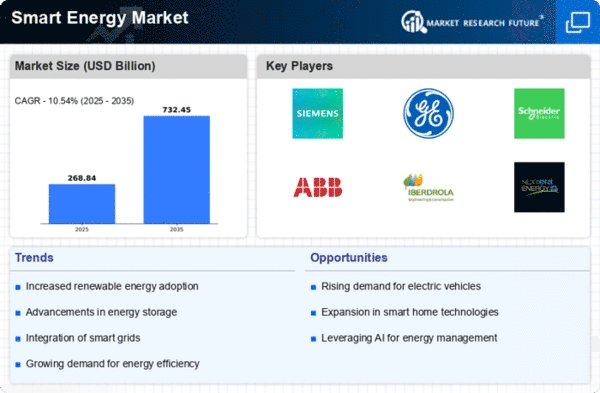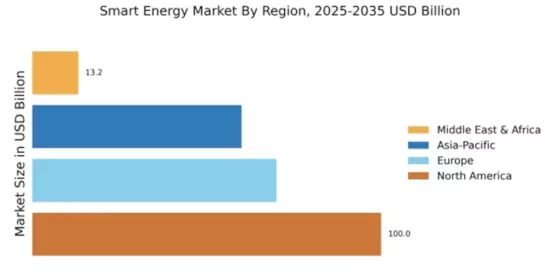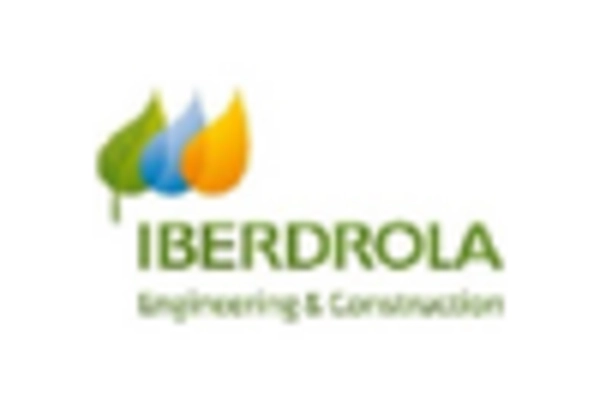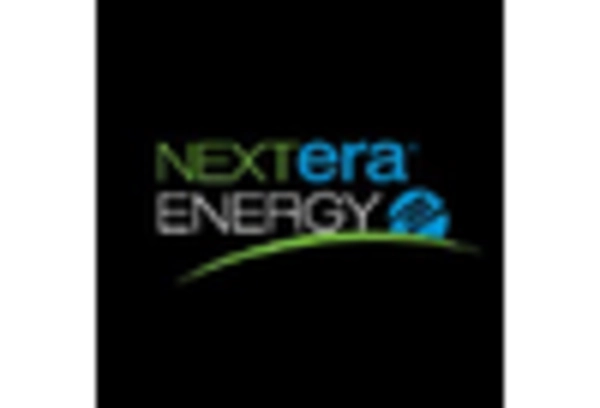Market Growth Projections
The Global Smart Energy Market Industry is poised for substantial growth, with projections indicating a rise from 210.1 USD Billion in 2024 to 662.7 USD Billion by 2035. This remarkable expansion reflects a compound annual growth rate of 11.01% from 2025 to 2035, driven by various factors including technological advancements, government initiatives, and increasing consumer awareness. The market's trajectory suggests a robust demand for innovative energy solutions that enhance efficiency and sustainability, positioning the industry as a key player in the global energy landscape.
Integration of Smart Grids
The integration of smart grids is transforming the Global Smart Energy Market Industry by enabling more efficient energy distribution and consumption. Smart grids utilize digital technology to monitor and manage energy flows, allowing for better integration of renewable energy sources and enhanced grid resilience. This modernization of the energy infrastructure is essential for accommodating the increasing demand for electricity and the growing penetration of distributed energy resources. As smart grid technologies continue to evolve, they are expected to play a vital role in shaping the future of energy management.
Rising Demand for Renewable Energy
The Global Smart Energy Market Industry experiences a notable surge in demand for renewable energy sources, driven by increasing awareness of climate change and the need for sustainable energy solutions. Governments worldwide are implementing policies to promote the adoption of renewables, which is reflected in the projected market growth from 210.1 USD Billion in 2024 to an estimated 662.7 USD Billion by 2035. This transition not only supports energy security but also aligns with global commitments to reduce greenhouse gas emissions, thereby enhancing the appeal of smart energy technologies.
Government Initiatives and Incentives
Government initiatives and incentives are crucial drivers of growth in the Global Smart Energy Market Industry. Various countries are establishing regulatory frameworks and financial incentives to encourage the adoption of smart energy solutions. For instance, tax credits, grants, and subsidies for renewable energy projects stimulate investment and innovation in the sector. These supportive measures not only enhance market attractiveness but also foster collaboration between public and private sectors, ultimately leading to a more resilient and efficient energy infrastructure.
Increasing Energy Efficiency Awareness
There is a growing awareness of energy efficiency among consumers and businesses, which significantly impacts the Global Smart Energy Market Industry. As energy costs rise, stakeholders are increasingly seeking solutions that reduce consumption and enhance operational efficiency. This trend is evident in the adoption of smart appliances and energy-efficient technologies, which contribute to lower utility bills and reduced environmental impact. The emphasis on energy efficiency is likely to propel market growth, as organizations recognize the long-term benefits of investing in smart energy solutions.
Technological Advancements in Energy Management
Technological innovations play a pivotal role in the Global Smart Energy Market Industry, facilitating the development of advanced energy management systems. These systems leverage artificial intelligence and machine learning to optimize energy consumption and enhance grid reliability. The integration of smart meters and IoT devices allows for real-time monitoring and control, which can lead to significant cost savings for consumers and utilities alike. As these technologies evolve, they are expected to contribute to a compound annual growth rate of 11.01% from 2025 to 2035, further driving market expansion.

















